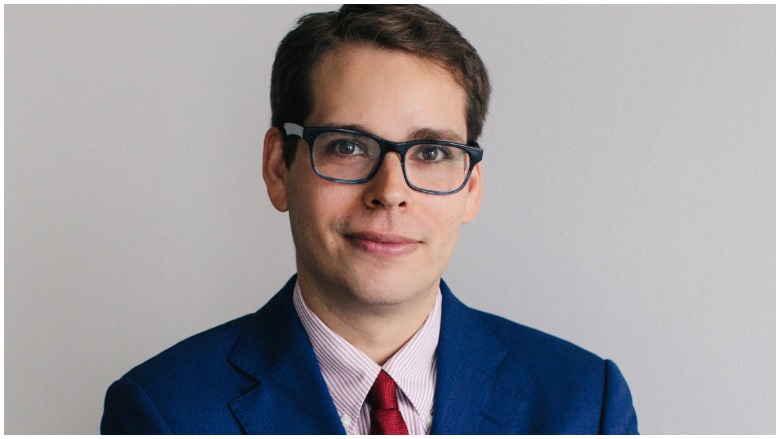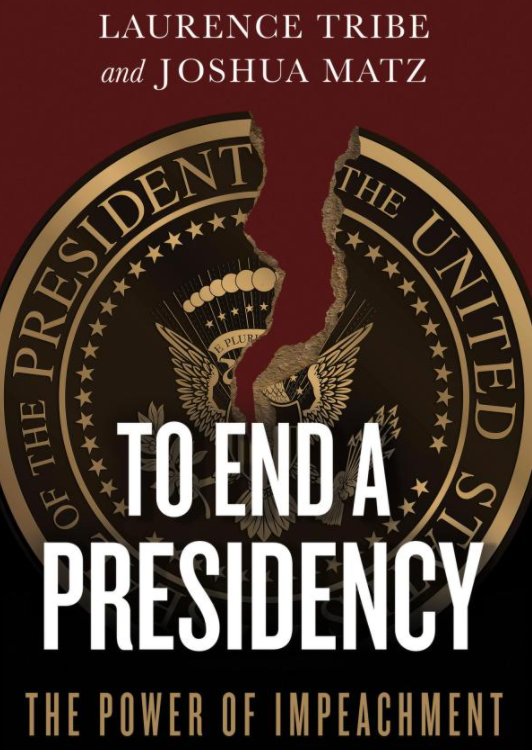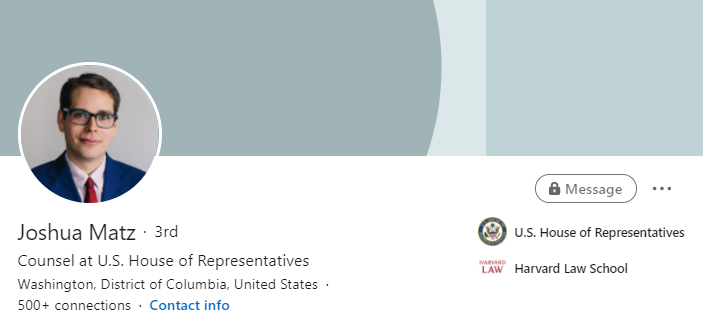
Joshua Matz is a constitutional lawyer and one of the attorneys brought on to represent the House of Representatives during former President Donald Trump’s impeachment trial. Matz, along with fellow Impeachment Counsel Barry Berke, worked with the House Judiciary Committee during Trump’s first impeachment trial. Both took leaves of absences from their respective law firms to work with Congress.
Matz has been recognized as a “rising star” by the National Law Journal for his legal work. According to his profile on Georgetown Law, where he is an adjunct professor, Matz specializes in “civil rights and constitutional litigation.”
Here’s what you need to know:
1. Matz Described the January 6 Rally as a ‘Powder Keg’ of Trump’s ‘Own Creation’ & That the Former President ‘Gleefully Lit a Match’
Matz co-wrote an opinion piece for the Washington Post two days after the January 6 riot in which he pushed for Congress to impeach Trump for a second time. He had not yet been rehired by Congress as an Impeachment Counsel, according to his bio on the article. (Bloomberg reported on January 15 that Matz and Berke had been hired by House Democrats as Impeachment Counsels).
Matz and co-author Laurence H. Tribe argued that Trump’s repeated assertion that the election had been stolen from him was a major factor in riling up his supporters that day:
He summoned them to D.C. for a “wild” protest as Congress met to certify the election results. He then whipped them into a frenzy and aimed the angry horde straight at the Capitol. When Trump’s mob breached the building, he inexcusably dawdled in deploying force to quell the riot. And when he finally released a video statement, it only made matters worse. Simply put, Trump knew perfectly well that his rally on Wednesday was a powder keg of his own creation. But he gleefully lit a match and tossed it at Congress.
Matz and Tribe also wrote that impeachment is not solely about removing an elected official from office: “Impeachment exists to protect us from future threats rather than to punish prior misconduct.” They made the argument that the founding fathers, and specifically the writers of the Constitution’s impeachment clause, “would not have hesitated to act” against Trump:
As the House concluded in December 2019, conduct that may be in some sense permitted by the Constitution (or the criminal code) can still be impeachable if undertaken in a grossly abusive manner or as part of a scheme that imperils democracy. Those who wrote the impeachment clause grasped the threat posed by leaders who deploy mob violence against officials and institutions of government that stand in their way.
Trump’s defense team, led by Bruce Castor and David Schoen, has countered that the Senate does not have the authority to try a former president. (According to the Congressional Research Service, the Constitution does not directly address this question but “a number of scholars have argued that the delegates at the Constitutional Convention appeared to accept that former officials may be impeached for conduct that occurred while in office.”)
Trump’s attorneys have also dismissed the assertion that the former president had incited the mob. As Reuters reported, they argued that when Trump told the crowd on January 6 that they needed to “fight like hell,” he was speaking in a “figurative sense.”
2. Matz Was Promoted to Partner at His Law Firm After the First Impeachment Trial & Was Named to a ‘Hot List’ of Rising Attorneys in 2020
Matz started working as an attorney with Kaplan Hecker & Fink in September 2017, according to his LinkedIn profile. He took a leave of absence from the firm from October 2019 until February 2020 while he was working as counsel to the House Judiciary Committee during Trump’s first impeachment trial.
When the trial was over, Matz was made a partner at Kaplan Hecker & Fink. According to a news release at the time, the firm’s founding partner described Matz as ” one of the greatest legal minds of his generation” and explained that Matz was “instrumental” in expanding the firm’s presence in Washington, D.C. The news release added that as a partner, “Matz’s practice will continue to focus on constitutional law, appellate litigation, and complex commercial disputes, oriented toward financial and technology sector legal issues.”
Matz was further recognized in 2020 for his legal work. In August 2020, Matz was named to Benchmark Litigation’s “40 & Under Hot List.” According to the publication, the annual list identifies “young ambitious and accomplished lawyers” who “frequently handle major cases – some of which are high-stakes or precedent-setting.”
Matz was also honored by the National Law Journal as a “2020 D.C. Rising Star.” Matz told the journal that working with the House Judiciary Committee had been the most significant accomplishment of his legal career at that point.
3. Matz Teaches Constitutional Litigation at Georgetown & Co-Wrote a Book on Impeachment

AmazonJoshua Matz and Laurence Tribe published “To End a Presidency: The Power of Impeachment” in 2018.
In addition to his legal responsibilities, Matz is also a law school professor. He has been an adjunct professor at Georgetown University since January 2018, according to his LinkedIn profile. He wrote on his account that he teaches a “seminar on constitutional litigation” along with a second professor.
According to Georgetown’s curriculum guide, Matz is currently teaching one course on constitutional litigation and how it applies to the executive branch. He may reference his own published work as a teaching guide.
Matz and Harvard Law professor emeritus Laurence Tribe co-wrote To End a Presidency: The Power of Impeachment, which was published in May 2018. As Matz’s law firm explained in a news release, the book explains the impeachment clause, how it has been used in the past and provide a “bold argument about its proper role today.” The firm added, “In an era of expansive presidential power and intense partisanship, we must rethink impeachment for the twenty-first century.”
Matz and Tribe also teamed up to write Uncertain Justice: The Roberts Court and the Constitution in 2014. According to its summary on Amazon, the book analyzed how Supreme Court Chief Justice John Roberts was “revising the meaning of our Constitution” during his tenure.
4. Matz Graduated From Harvard Law in 2012 & Served as a Supreme Court Clerk

LinkedInJoshua Matz.
Matz earned his bachelor’s degree from the University of Pennsylvania in 2008, according to his LinkedIn profile. He then earned a postgraduate degree at the University of Oxford before beginning law school at Harvard. While a law student, Matz served as the “Articles and Book Review” chair at the Harvard Law Review, Forbes reported.
Matz moved to New York City after graduating with his law degree. He was a summer clerk for the trial attorneys at Neufeld Scheck & Brustin in 2012 before accepting a position as a clerk for Judge J. Paul Oetken in the Southern District of New York.
Matz’s next move was to the west coast. In August 2013, he began a one-year stint as a clerk to Judge Stephen Reinhardt of the Ninth Circuit Court of Appeals. According to his LinkedIn profile, Matz moved to Washington, D.C. in 2014 as a law clerk for Supreme Court Justice Anthony Kennedy.
That same year, Forbes put Matz on its “30 under 30” Law & Policy List. Two years later, the magazine again recognized Matz as an “All-Star Alumni.”
5. Matz Defended Justice Kennedy’s Decision in the Case Over a Baker’s Right to Refuse to Make a Cake for Same-Sex Wedding
Matz was working for Justice Kennedy when the Supreme Court ruled 5-4 to legalize same-sex marriage nationwide in June 2015. Kennedy wrote in the majority opinion that same-sex couples deserved “equal dignity in the eyes of the law.”
Three years later, Kennedy was criticized within the LGBTQ community for appearing to take a very different stance on the issue of gay rights. Kennedy sided with the majority in the “Masterpiece Cakeshop v. Colorado Civil Rights Commission” case. The Supreme Court ruled 7-2 that a cakeshop owner could refuse to bake a cake for a same-sex wedding.
As Matz explained in an op-ed for The Guardian, he wrote a brief arguing for a different outcome. But in the piece, Matz also defended his former boss for the court decision. Matz explained that Kennedy had written a “narrow” opinion that focused on specific details of the case that had to do with freedom of religion. Matz also argued that the case did not blemish Kennedy’s legacy:
The idea that Masterpiece Cakeshop has undermined Kennedy’s legacy must be rejected. As his decades of jurisprudence make clear, Kennedy cares deeply about LGBTQ rights, religious freedom, and the emergence of social understandings and legal rules that allow each of those values to flourish. It’s no damning indictment that he failed to solve that impossible puzzle in a single opinion. To the contrary, Kennedy should be commended for assembling a diverse coalition as he strives to help us all find a path forward through troubled waters.
READ NEXT: Bruce Castor’s Wife & Kids: 5 Fast Facts
